John Major Worksheets
Do you want to save dozens of hours in time? Get your evenings and weekends back? Be able to teach about John Major to your students?
Our worksheet bundle includes a fact file and printable worksheets and student activities. Perfect for both the classroom and homeschooling!
Resource Examples
Click any of the example images below to view a larger version.
Fact File
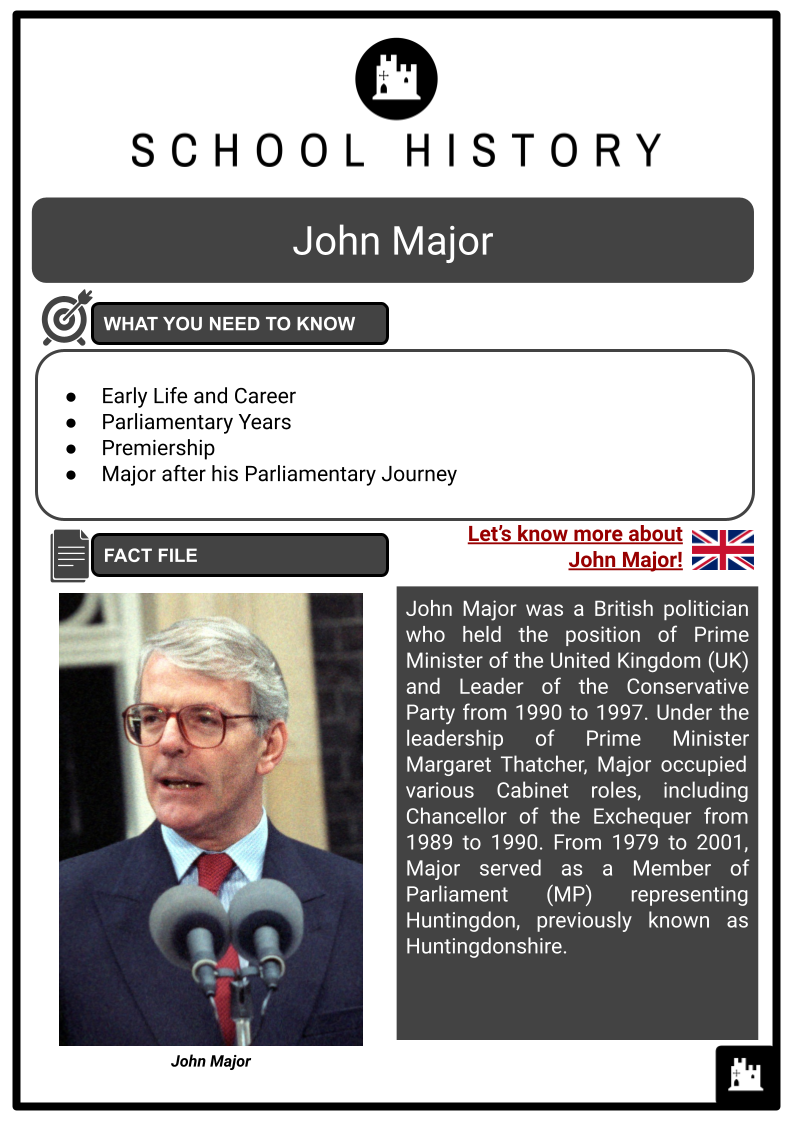
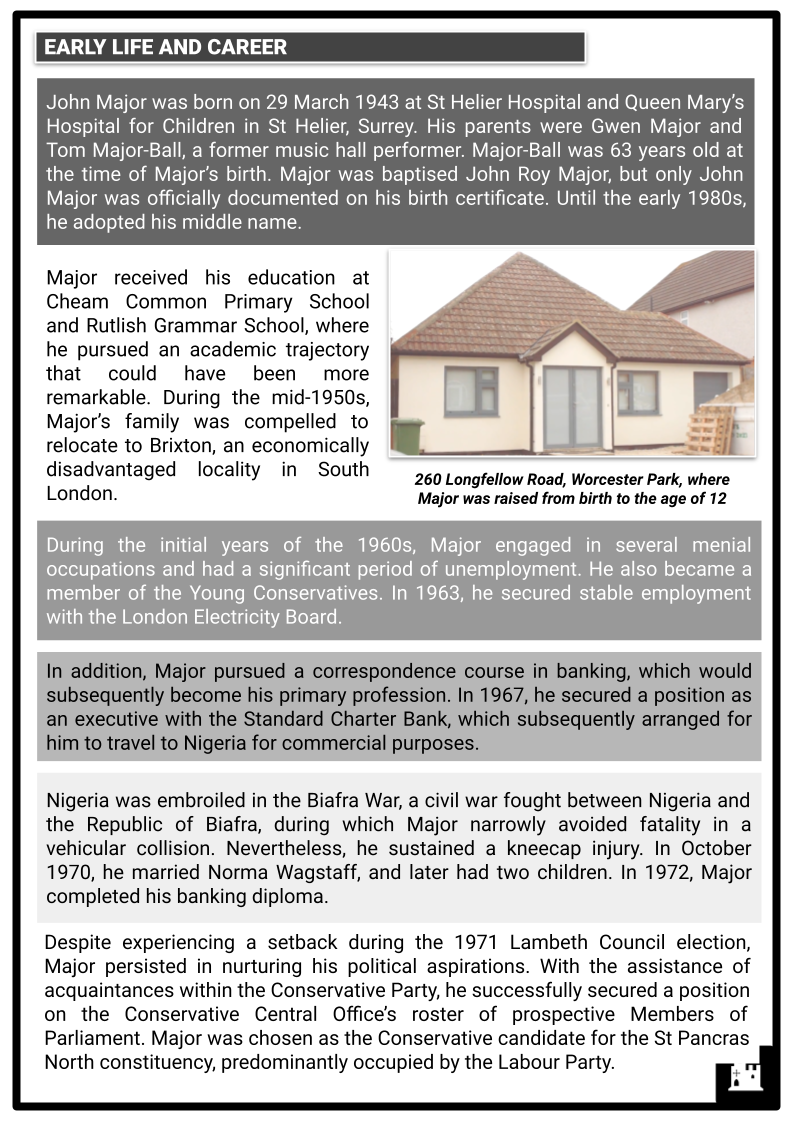
Student Activities
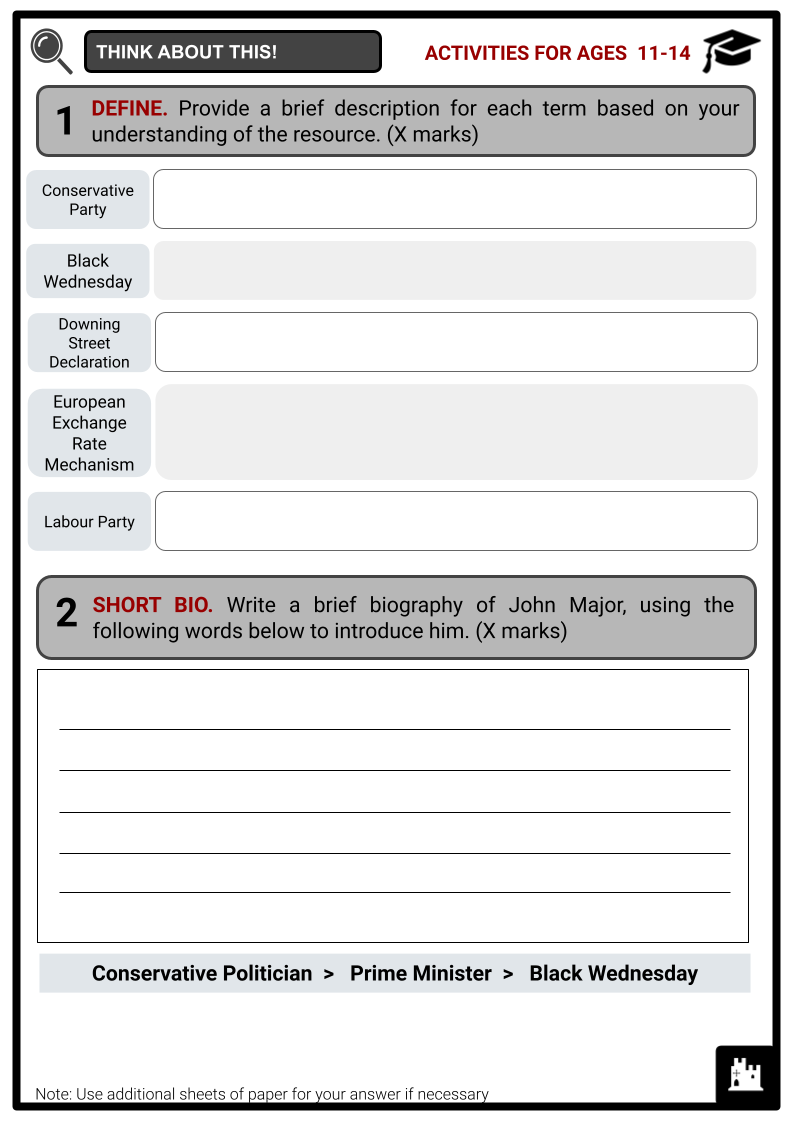
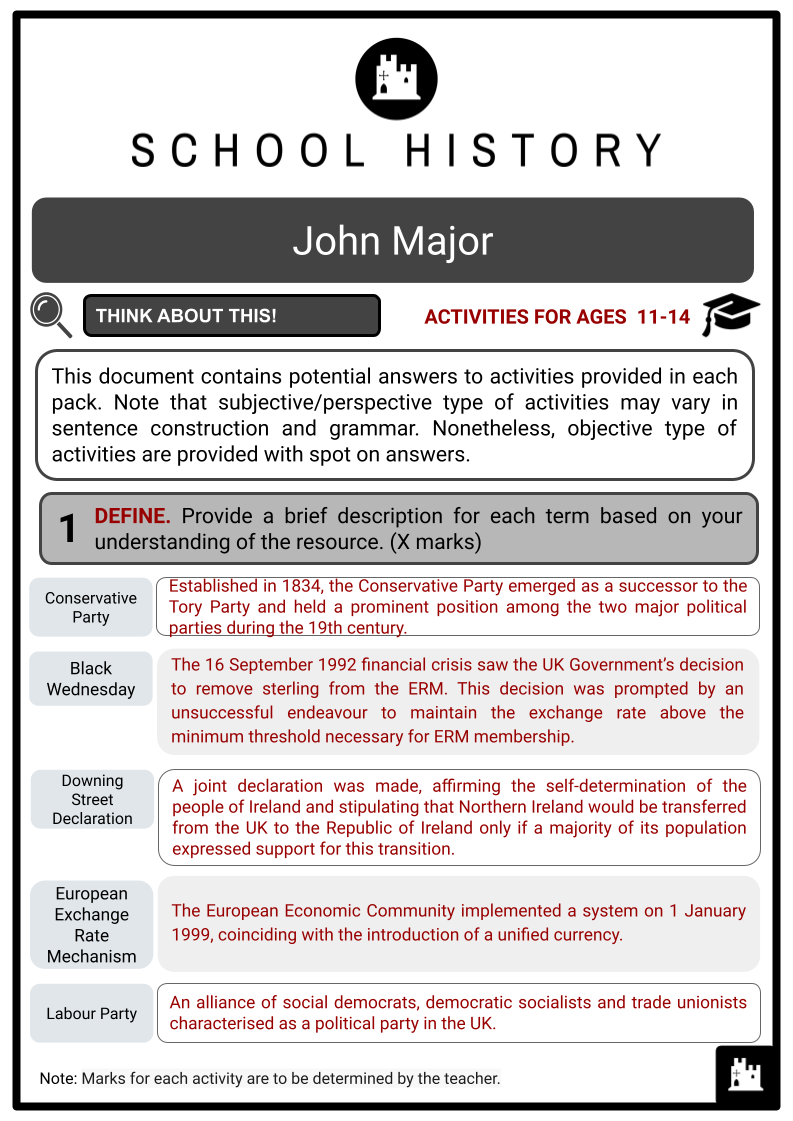
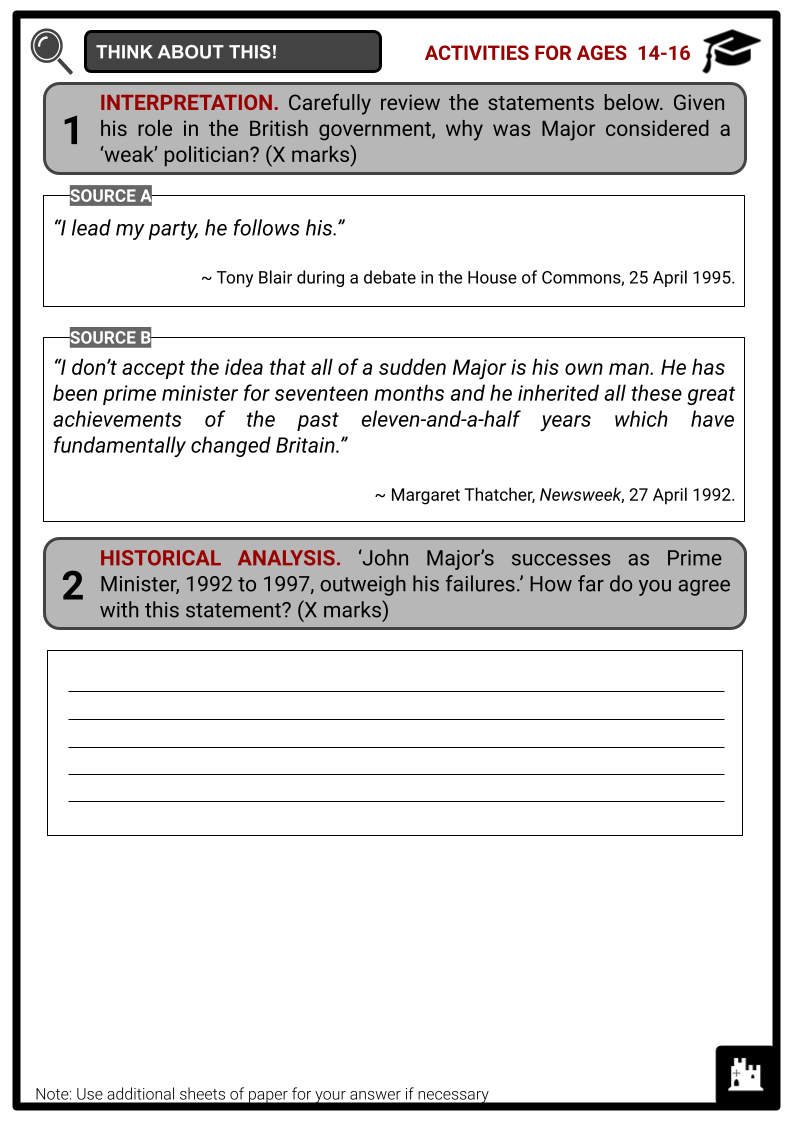
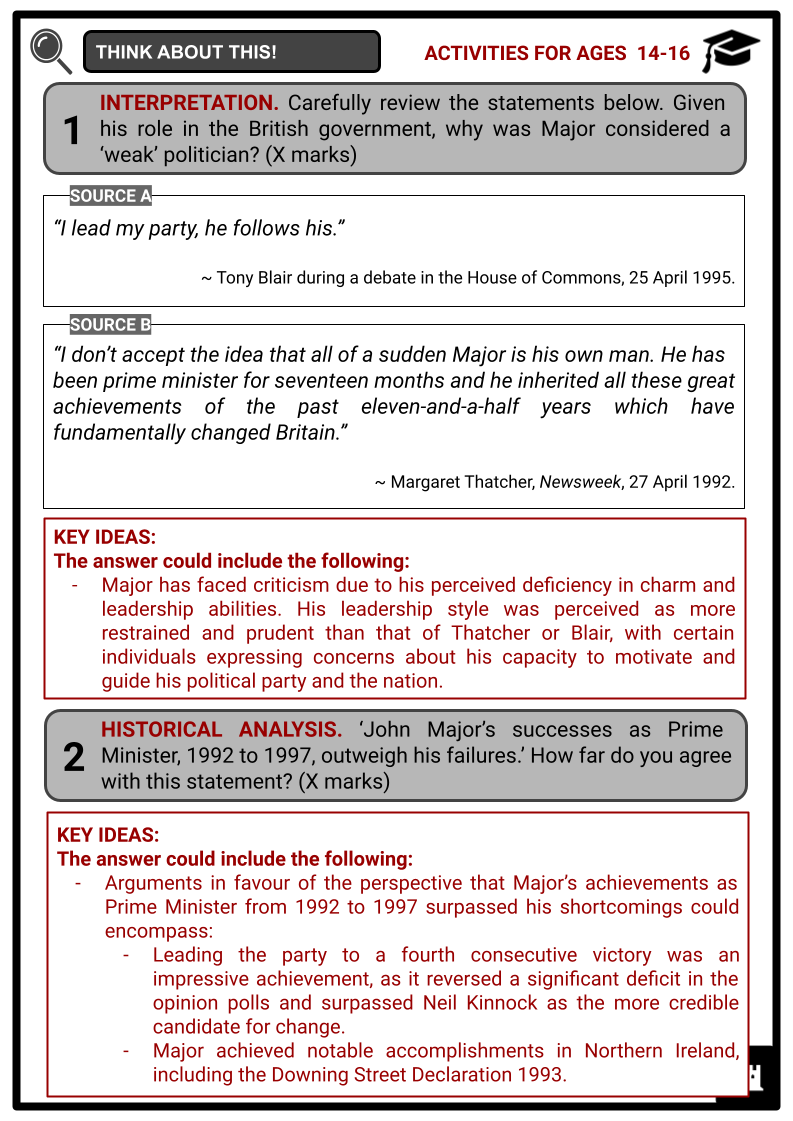
Summary
- Early Life and Career
- Parliamentary Years
- Premiership
- Major after his Parliamentary Journey
Key Facts And Information
Let’s know more about John Major!
John Major was a British politician who held the position of Prime Minister of the United Kingdom (UK) and Leader of the Conservative Party from 1990 to 1997. Under the leadership of Prime Minister Margaret Thatcher, Major occupied various Cabinet roles, including Chancellor of the Exchequer from 1989 to 1990. From 1979 to 2001, Major served as a Member of Parliament (MP) representing Huntingdon, previously known as Huntingdonshire.
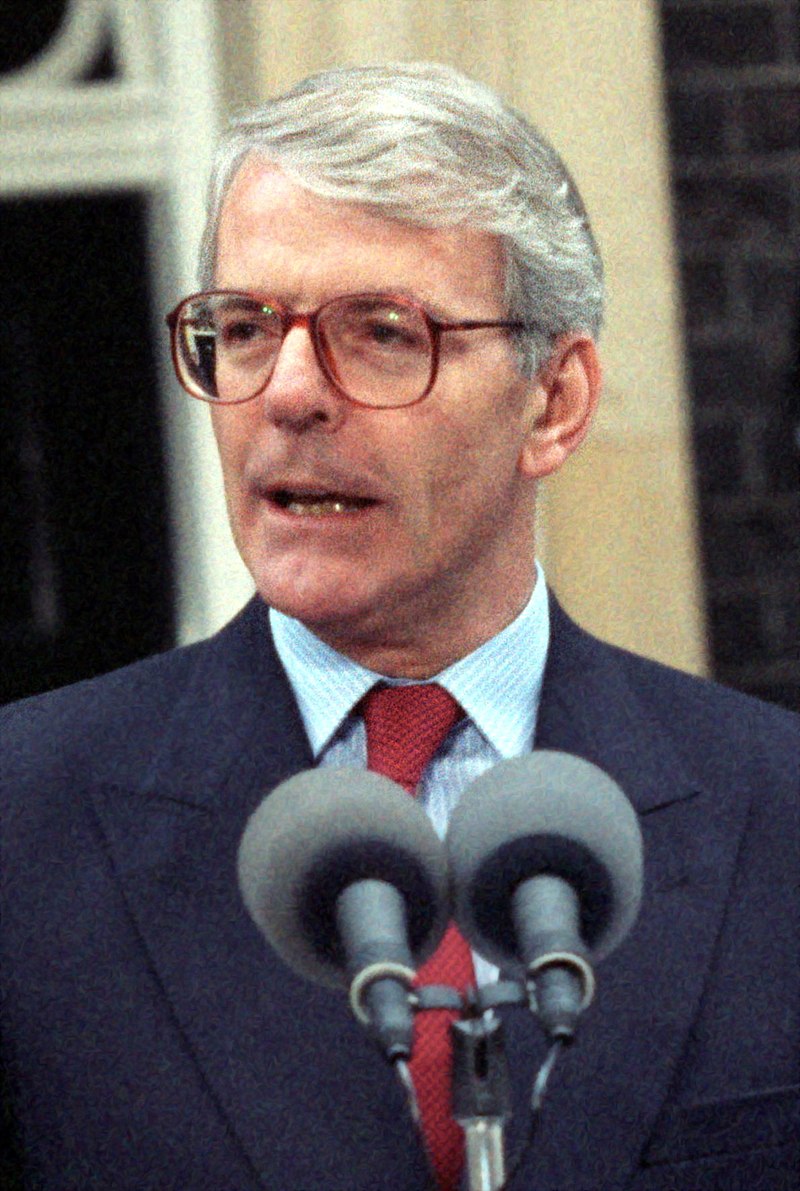
EARLY LIFE AND CAREER
- John Major was born on 29 March 1943 at St Helier Hospital and Queen Mary’s Hospital for Children in St Helier, Surrey. His parents were Gwen Major and Tom Major-Ball, a former music hall performer. Major-Ball was 63 years old at the time of Major’s birth. Major was baptised John Roy Major, but only John Major was officially documented on his birth certificate. Until the early 1980s, he adopted his middle name.
- Major received his education at Cheam Common Primary School and Rutlish Grammar School, where he pursued an academic trajectory that could have been more remarkable. During the mid-1950s, Major’s family was compelled to relocate to Brixton, an economically disadvantaged locality in South London.
- During the initial years of the 1960s, Major engaged in several menial occupations and had a significant period of unemployment. He also became a member of the Young Conservatives. In 1963, he secured stable employment with the London Electricity Board.
- In addition, Major pursued a correspondence course in banking, which would subsequently become his primary profession. In 1967, he secured a position as an executive with the Standard Charter Bank, which subsequently arranged for him to travel to Nigeria for commercial purposes.
- Nigeria was embroiled in the Biafra War, a civil war fought between Nigeria and the Republic of Biafra, during which Major narrowly avoided fatality in a vehicular collision. Nevertheless, he sustained a kneecap injury. In October 1970, he married Norma Wagstaff, and later had two children. In 1972, Major completed his banking diploma.
- Despite experiencing a setback during the 1971 Lambeth Council election, Major persisted in nurturing his political aspirations. With the assistance of acquaintances within the Conservative Party, he successfully secured a position on the Conservative Central Office’s roster of prospective Members of Parliament. Major was chosen as the Conservative candidate for the St Pancras North constituency, predominantly occupied by the Labour Party.
- Major participated in the general elections held in February and October 1974, experiencing significant defeats against Albert Stallard, the Labour candidate. Major made multiple fruitless attempts until December 1976 to be chosen as a candidate for a more promising position.
- Exasperated by his growing frustration, Major made a final effort to seek the secure Conservative seat of Huntingdonshire and ultimately achieved his goal.
PARLIAMENTARY YEARS
- In the 1979 general election, Major emerged victorious in the Huntingdon constituency, facilitating Thatcher’s ascension to power. After winning, Major diligently sought out connections at all party levels, actively participating in the informal ‘Guy Fawkes Club’ of Conservative Members of Parliament and engaging in numerous Committees. He assumed the role of Secretary of the Environment Committee. He also supported the development of the Housing Act 1980, a legislative measure that granted council house occupants the Right to Buy their residences.
1981 - Major was appointed as Parliamentary Private Secretary.
1983 - Major was designated as the assistant party whip, overseeing all Members of Parliament in East Anglia.
1984 - Major was invited to join the ‘Blue Chip’ group, a prestigious social organisation catering to emerging talents within the Conservative Party. Additionally, he was designated as the Treasury Whip.
1985 - The appointment of Major as Parliamentary Under-Secretary of State for the Department of Health and Social Security (DHSS) was made.
1986 - In the DHSS, Major assumed the position of Minister of State. In October, Major delivered his inaugural address at a Conservative Party Conference.
1987 - Major was elevated to the position of Cabinet member and rose to the position of Chief Secretary to the Treasury.
1989 - Despite his limited experience in foreign affairs, Major was appointed Foreign Secretary. He was appointed Chancellor of the Exchequer after a mere three months of serving as Foreign Secretary, following the resignation of the preceding chancellor due to a disagreement with Thatcher.
1990 - Thatcher tendered her resignation due to her inability to secure the requisite votes to unequivocally emerge victorious in a leadership election within her political party. Major opted to pursue the position of Prime Minister, and despite falling two votes short of securing an overall majority, he garnered a significantly larger number of votes than his two rivals. On 28 November 1990, he assumed the position of Prime Minister.
PREMIERSHIP
- Major faced significant challenges upon assuming the role of Prime Minister. Initially, people embraced Major’s reserved, unassuming and humble demeanour in public, although it swiftly became evident that he lacked the necessary qualifications for the position. The initial two years of Major’s tenure as Prime Minister were congruent with an economic downturn characterised by elevated levels of unemployment. Surprisingly, he opted to hold an election in 1992, resulting in the Conservatives securing an unprecedented majority of 42% of the vote.
Black Wednesday
- One of the worst periods of Major’s tenure as Prime Minister occurred on 16 September 1992, commonly referred to as Black Wednesday. Due to Britain’s inability to maintain the pound within the exchange rate restrictions established by the European Community, Major was compelled to withdraw the British pound from the European Exchange Rate Mechanism (ERM).
- In the UK and throughout Europe, Black Wednesday fundamentally altered the political and economic landscapes, and certain lessons are still being applied more than 25 years later. The failure of the ERM and other early initiatives to establish a forerunner to the euro fostered anxieties about an ever-closer Europe. It ultimately prevented the UK from adopting the single currency.
- The importance of the operational independence of the Bank of England and the distinction between long-term, stable economic policy and the shorter, more erratic terms of governments that come and go was further highlighted by Black Wednesday.
- The crisis diminished the second Major ministry’s ability to handle economic issues with credibility. The weakening of the pound and the adoption of an inflation-targeting monetary stability policy in place of the ERM have been credited with helping the UK economy recover in the years after Black Wednesday.
- The electorate was more likely to agree with the opposition’s assertion that the economic recovery should be attributed to outside forces rather than Conservative Party government policies because the Conservative Party government’s reputation for economic excellence had been damaged. Black Wednesday was a major factor in the Conservatives finally losing the 1997 general election to Labour, who won by a landslide under the leadership of Tony Blair.
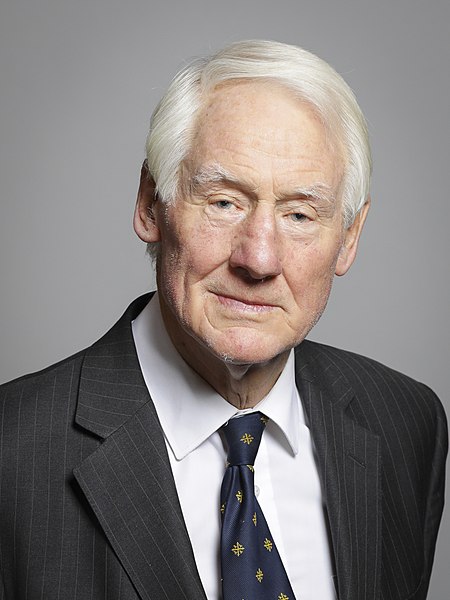
Major and the Northern Ireland
- According to the former cabinet secretary Robin Butler, Major took more risks than Blair to achieve peace in Northern Ireland. He claims that his accomplishments are unfairly disregarded. By drafting and signing the 1993 Downing Street Declaration with his Irish counterpart, Albert Reynolds, Major set the stage for the 1998 Good Friday Agreement.
- The Downing Street Declaration said Northern Ireland would only be transferred from the UK to the Republic of Ireland if most of its people supported such a move. It also acknowledged the right of the Irish people to self-determination. The notion of consent, according to which the citizens of the island of Ireland had the exclusive authority to settle disputes between the North and the South by mutual consent, was also incorporated as part of the perspective of the so-called ‘Irish dimension’.
1995 and 1997 Election
- Since his reelection in 1995, there had been rumours about Major’s leadership. These rumours grew more intense as it became more apparent that the Conservatives would lose the forthcoming general election by a landslide. During this time, Michael Portillo, a Conservative Party politician, was regularly mentioned as the front-runner to succeed Major. However, he was disqualified from competing after losing his seat in the election.
- Because of the 1997 election defeat, many Conservative MPs wanted Major to step down as leader immediately. However, a grassroots movement within the party, supported by his political allies, called for him to remain in that position until the defeat.
- Alastair Goodlad, the chief whip, and Robert Michael James Gascoyne-Cecil, who served as his chief of staff during the election, begged him to continue as leader for a few more months so that the party could acknowledge its crushing defeat and choose a replacement.
- While the leadership election to succeed him took place, Major held the title of Leader of the Opposition for seven weeks. Although he created a short-term Shadow Cabinet, seven cabinet members were defeated in the election. Few senior MPs were left to take their position, and some had to handle numerous briefs.
- The position of Shadow Secretary of State for Scotland was not filled until after the 2001 general election because the party no longer had any Scottish MPs. Major himself held the positions of Shadow Foreign Secretary and Shadow Secretary of State for Defence.
MAJOR AFTER HIS PARLIAMENTARY JOURNEY
- Significantly, Major extended his passion for cricket by assuming the role of President of the Surrey County Cricket Club from 2000 to 2001, serving as an Honorary Life Vice-president since 2002. In March 2001, he paid tribute to the respected cricketer Colin Cowdrey during a memorial service at Westminster Abbey.
- In 2005, he was elected to the Committee of the Marylebone Cricket Club, which has traditionally served as the sport’s regulating body and continues to uphold the game’s regulations. In 2011, Major left the group, expressing apprehensions about the proposed reconstruction of Lord’s Cricket Ground.
- In February 2012, Major assumed the position of chairman of the Queen Elizabeth Diamond Jubilee Trust, an institution established to commemorate the Diamond Jubilee of Elizabeth II. After the 2010 general election, Major expressed his endorsement of the David Cameron and Nick Clegg coalition and his desire for a liberal-conservative alliance beyond 2015. He pointed out that under Ed Miliband, Labour had been engaging in party games instead of prioritising the national interest.
- Major aggressively advocated for a ‘No’ vote during the 2014 Scottish independence referendum, asserting that a vote favouring independence would have detrimental consequences for Scotland and the rest of the UK.
- In February 2022, Major delivered a speech at the Institute for Government think-tank in London when he expressed his disapproval of UK Prime Minister Boris Johnson’s actions about the Partygate affair. He advocated for Johnson’s resignation and condemned the proposed policy for refugee seekers, characterising it as ‘un-British’. During an address at the Northern Ireland Affairs Select Committee in February 2023, Major expressed his belief that Brexit was a significant error and acknowledged that Johnson had accepted the Brexit protocol despite its chaotic nature.
LEGACY
- Major has been deemed an unsuccessful Prime Minister by some. He was frequently regarded as a leader devoid of colour and personality. Some individuals have expressed a more favourable evaluation of Major’s tenure as Prime Minister.
- According to journalist Peter Oborne, Major was a Prime Minister who was honest, decent and capable. He left Britain in a relatively better state than when he came to power. A political historian and biographer, Robert Taylor presents a somewhat impartial perspective on Major. He highlights that Major received a ‘dreadful inheritance’ from Thatcher amid an economic downturn and emphasises the need to consider this while evaluating his achievements.
- Taylor emphasises that Major achieved a remarkable electoral triumph for his party in 1992 and left the nation’s economy significantly improved compared to its state when he came to power. His ultimate evaluation of Major is an appropriate inference:
[...] he was an extraordinary ordinary man whose period as Prime Minister deserves to be treated in its own terms and with more compassion and a deeper understanding of what he faced and what he sought to achieve [...]
Frequently Asked Questions
- Who is John Major?
John Major is a British politician who served as Prime Minister of the UK from 1990 to 1997. He was a member of the Conservative Party and succeeded Margaret Thatcher as Prime Minister.
- What were John Major's early political career and background?
John Major began his political career in local government before being elected as a Member of Parliament (MP) in 1979. Before becoming Prime Minister, he held various ministerial positions in the Thatcher government, including Chief Secretary to the Treasury and Foreign Secretary.
- How did John Major become Prime Minister?
John Major became Prime Minister in November 1990 following the resignation of Margaret Thatcher. He won the Conservative Party leadership election, leading the party to victory in the 1992 general election.
